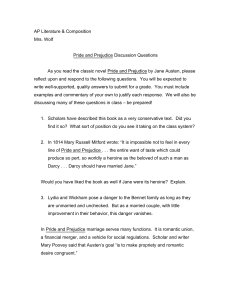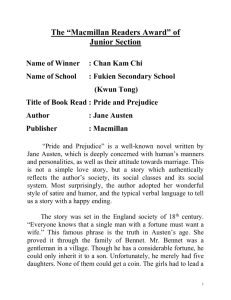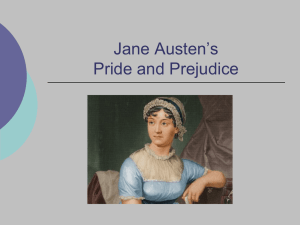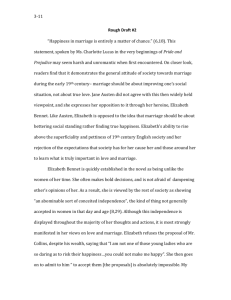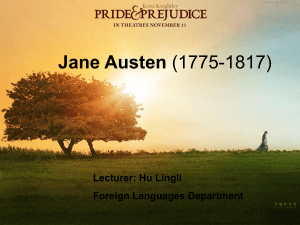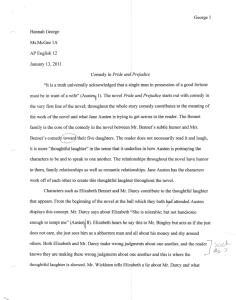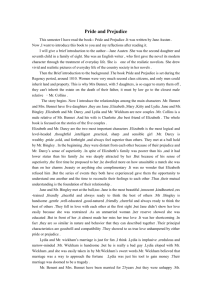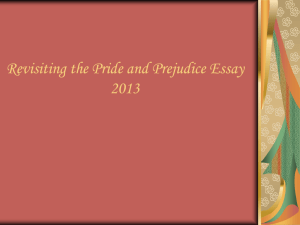Pride and Prejudice like many of Jane Austen's novels is about a
advertisement
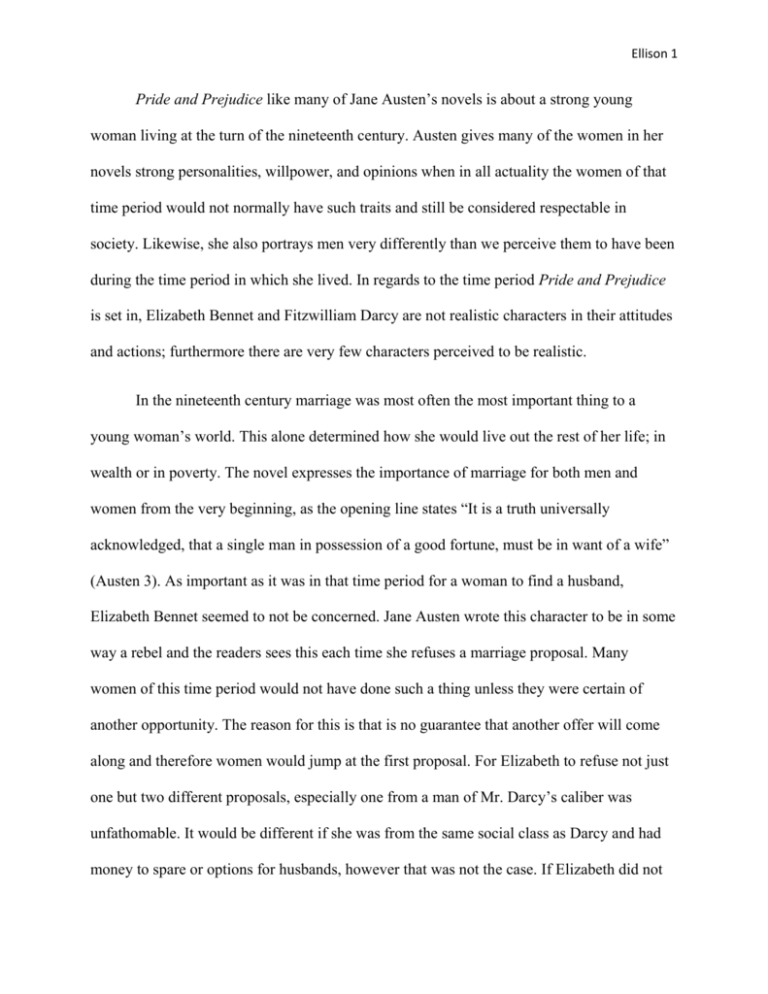
Ellison 1 Pride and Prejudice like many of Jane Austen’s novels is about a strong young woman living at the turn of the nineteenth century. Austen gives many of the women in her novels strong personalities, willpower, and opinions when in all actuality the women of that time period would not normally have such traits and still be considered respectable in society. Likewise, she also portrays men very differently than we perceive them to have been during the time period in which she lived. In regards to the time period Pride and Prejudice is set in, Elizabeth Bennet and Fitzwilliam Darcy are not realistic characters in their attitudes and actions; furthermore there are very few characters perceived to be realistic. In the nineteenth century marriage was most often the most important thing to a young woman’s world. This alone determined how she would live out the rest of her life; in wealth or in poverty. The novel expresses the importance of marriage for both men and women from the very beginning, as the opening line states “It is a truth universally acknowledged, that a single man in possession of a good fortune, must be in want of a wife” (Austen 3). As important as it was in that time period for a woman to find a husband, Elizabeth Bennet seemed to not be concerned. Jane Austen wrote this character to be in some way a rebel and the readers sees this each time she refuses a marriage proposal. Many women of this time period would not have done such a thing unless they were certain of another opportunity. The reason for this is that is no guarantee that another offer will come along and therefore women would jump at the first proposal. For Elizabeth to refuse not just one but two different proposals, especially one from a man of Mr. Darcy’s caliber was unfathomable. It would be different if she was from the same social class as Darcy and had money to spare or options for husbands, however that was not the case. If Elizabeth did not Ellison 2 marry she would be thrown out on the street because the Bennet home passed directly to the next male in the family, not any of the five Bennet daughters. A relaxed disposition about marriage for a woman in her twenties at the turn of the nineteenth century would have been an oddity at best. As much as the reader can see Elizabeth’s attitude towards marriage we can even more clearly see her rebellious and outspoken behavior in society which is opposite of what we know of respectable women in this day. The scene in which this is most apparent is when Lady Catherine De Bourgh accuses Elizabeth of being engaged to Darcy. After being accused and lectured by Lady Catherine about the impending engagement of her daughter to Darcy, Elizabeth has enough and rudely interrupts her by saying “You can now have nothing further to say. You have insulted me in every possible method…Neither duty, nor honour, nor gratitude, have any possible claim on me in the present instance” (Austen 233-234). This scene truly shows how unmoved Elizabeth is by social expectations. No one of her class would ever think to speak to someone such as Lady Catherine De Bough in this manner. The reader constantly sees Mr. Collins speaking to her as if she were a member of the royal family and doing anything and everything she demands. Elizabeth however is not this way and yet the only person who seems concerned about her actions is Lady Catherine. Her parents, sisters, and anyone else who could be negatively affected by this do not say a word. In this type of society Lady Catherine could do nearly anything she wanted to do to ensure that the reputation of the Bennet family is ruined which would normally make the family members astonished and appalled that Elizabeth would act this way. However, keeping in the unrealistic theme they do not. Elizabeth is again unrealistic in her social behavior in the way Ellison 3 she speaks to Mr. Darcy. Most of the young women in that day would try to swoon him and do everything they could to win him over however, Elizabeth does exactly the opposite. She judges him as soon as she sees him; and extremely harshly. Because of her quick judgment, she is sharp with him and speaks to him in a manner that is unexpected for a woman of her station. While visiting Netherfield to help care for Jane, Elizabeth is in a conversation with Darcy and Miss Bingley discussing the definition of an ‘accomplished woman’. Both Miss Bingley and Darcy explain their opinion and Elizabeth snaps back at Mr. Darcy saying “I am no longer surprised at your knowing only six accomplished women. I rather wonder now at your knowing any.” (Austen 27). Elizabeth obviously shows a bit of a sarcastic nature in this statement as a woman in her situation with the opportunity to speak personally with a man like Darcy would most likely agree with anything he said. “Men with all their money and privilege, are not permitted to seem powerful in Pride and Prejudice…the most authentically powerful character is an unmarried, middle class woman without fortune” (Newton 29). In the time of Jane Austen men were considered all powerful. They were the ones with the access to money, employment, travel, etc. However, Austen changes things in the novel Pride and Prejudice as she writes it to seem as though Elizabeth is the one with the power, not Darcy. “As givers of economic benefit, men expect their advances to be received, even sought for” (Newton 31). Mr. Collins is a prime example of this as he thoroughly expects his proposal to Elizabeth to not only be accepted but filled with joy because he is doing them a favor as a male, so when she rejects him he is in shock. Elizabeth’s refusal of Darcy is even more powerful because even though she says no to his marriage proposal, he does give up; in Ellison 4 fact he is even more attracted. If this were to happen in Austen’s society that woman would have been considered uncivilized and disrespectful. At the end of the novel Elizabeth shows her immense power through “her ability to turn her critical vision upon herself” (Newton 38). In that time women were considered mainly the property of their husband and expected to follow his rules and the rules of society. Therefore, Elizabeth’s ability to think on her own, develop her own opinions, as well as admit she was wrong is an extremely powerful thing. According to feminist Judith Lowder Newton, perhaps the most powerful and enjoyable thing about Elizabeth Bennet is the fact that Austen makes us believe in her. When it comes to power Darcy is also very unrealistic because in that time, with all his wealth, he would be considered one of the most powerful men in society. On the outside and at first glance he does seem powerful. When we first see Mr. Darcy he is described by the men “to be a fine figure of a man (while) the ladies declared he was much handsomer than Mr. Bingley, and he was looked at with great admiration for about half the evening, till his manners gave a disgust which turned the tide of his popularity for he was discovered to be proud, to be above his company, and above being pleased” (Austen 8). This would at first make it seem as though he was in fact very powerful but as the novel progresses we see his power diminish as Elizabeth’s shines through. Most powerful men in his situation would take the actions of woman of Elizabeth’s station as disrespectful, uncivilized, and absolutely unacceptable. However, he does not; in fact attracts him even Ellison 5 more to her. It is in this that the reader can clearly see that Elizabeth, a woman, holds all the power. Jane Austen writes many of her characters to be unrealistic, but as she would want them to be. However there are a few that are written as they would actually be in real nineteenth century living. Mrs. Bennet is perhaps the most obvious of these characters. Throughout the entire novel we see her running around constantly in search of husbands for her five daughters. We see very early her desire for her daughters to be better off. While trying to convince her husband to pay an initial visit to Mr. Bingley so that they can take the girls she states “But consider your daughters. Only think what an establishment it would be for one of them” (Austen 4). She is a little bit crazy and obsessed but she really does have the best interest of her daughters at heart. Most mothers, especially those with five daughters and no sons, would act exactly as Mrs. Bennet does. She understands the reality of her daughters impending poverty if they do not wed above their current status. Thankfully, at least for her two eldest daughters, they marry extremely well and she reacts exactly as most mothers in her time would. “Good gracious! Lord bless me! Only think! Dear Me! Mr. Darcy! Who would have thought it! And is it really true? Oh! My sweetest Lizzy! How rich and great you will be! What pin-money, what jewels, what carriages you will have! Jane’s is nothing to it-nothing at all. I am so pleased-so happy!” (Austen 246). Mrs. Bennet gives the reader a real insight into what life was like as a mother of five daughters during this time. She was so concerned with their marriage that she was Ellison 6 completely overjoyed with Lydia’s marriage. “My dear, dear Lydia! This is delightful indeed! She will be married! She will be married at sixteen!” (Austen 198). Even though her marriage was not done appropriately and was to an ungodly man, Mrs. Bennet was more concerned about the fact that she had a daughter married, regardless of how or to whom. Mrs. Bennet gives us an inside look at what a real woman of the nineteenth century would have acted like, even if she was a bit eccentric. Three things were possibly the most important parts of the lives of those who lived around the turn of the nineteenth century; marriage, social expectations of behavior, and power. Elizabeth Bennet did not seem at all worried about marriage as she rejected two different men. She was also a very rebellious young woman who shared her opinion freely. Although men were considered powerful in most societies, in this novel Elizabeth is written as the more powerful personality while Darcy is the lesser of the two. Therefore, because of the obvious difference in their behavior and feelings towards certain things compared to the time period in which they would have lived, Elizabeth Bennet and Fitzwilliam Darcy are not realistic characters. Jane Austen was a woman who wrote about things she lived around every day; money, marriage, and social status. She however, wrote as she wished things would have been in her life-a woman with a strong personality, opinion and who was not afraid to express herself. Ellison 7 Works Cited Austen, Jane. Pride and Prejudice. Third ed. New York: W.W. Norton &, 2001. Print. Lowder Newton, Judith. ""Pride and Prejudice": Power, Fantasy, and Subversion." Feminist Studies Inc. 4.1 (1978): 27-42. JSTOR. Web. 20 June 2013.
